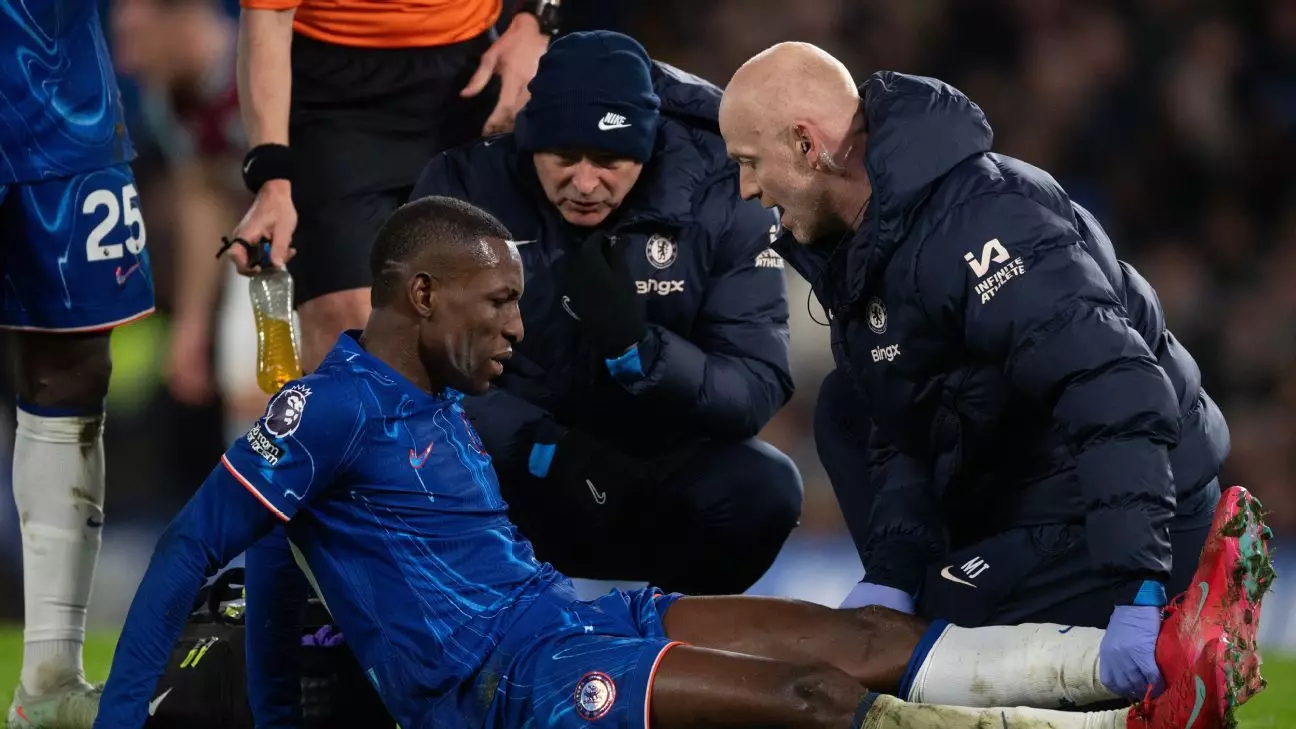In the bustling world of football, injuries can significantly alter a team’s trajectory, impact morale, and challenge tactical approaches. For Chelsea FC, under the guidance of Enzo Maresca, this reality has become particularly poignant with the recent injury of Nicolás Jackson. The forward, who has been an integral part of the team dynamics, will be sidelined until April due to a hamstring injury sustained in the match against West Ham on February 3. The implications of this setback are multifaceted, affecting not just team performance but also player morale and strategic planning.
The Diagnosis and Its Impacts
Following a scan, it was confirmed that Jackson’s injury is more severe than initially suspected. The prognosis cites a recovery period of approximately six to eight weeks, which means he is unlikely to feature until after the international break. Maresca expressed disappointment, noting that while Jackson had displayed positive reactions to the injury, the situation turned out to be more serious than anticipated. This moment underscores a common theme in football: the uncertainty surrounding injuries and the potential for misjudgment based on initial assessments.
With Jackson now off the table, the Chelsea manager faces pressing questions regarding who will step up in his absence. The options seem limited. Cole Palmer has emerged as a potential candidate for the role of a false nine. Still, there are concerns about whether he can replicate Jackson’s capabilities. Meanwhile, the potential of wantaway forward Christopher Nkunku, who missed out on a transfer to Bayern Munich, adds another layer of complexity to Chelsea’s forward options. The current situation calls for significant tactical adjustments, with Maresca likely having to operate outside his usual game plan.
Maresca took the opportunity to defend Jackson amid criticism about his goal-scoring prowess, a reminder that players are often judged harshly, particularly in a league as competitive as the Premier League. Jackson has delivered a respectable tally of nine goals in 24 appearances; however, the public scrutiny surrounding poorer finishing can overshadow his overall contributions to the team.
In the aftermath of Chelsea’s dismal exit from the FA Cup against Brighton, Maresca pointedly remarked, “Sometimes we complain about players, but then when they don’t play, we realize how important they are for the team.” This statement resonates not only as a defense of Jackson but also as a poignant reminder of the need for team cohesion and the subtle, often overlooked aspects each player brings to the squad. Without Jackson’s unique skill set, Chelsea may find themselves struggling to find reliable scoring opportunities.
In addition to Jackson’s injury woes, Chelsea is navigated by another significant decision regarding their goalkeeping lineup. Maresca has confirmed that Filip Jørgensen has taken over as the first-choice goalkeeper, displacing Robert Sánchez. This shift comes on the back of Sánchez’s inconsistent performances, which have drawn criticism.
Maresca’s decision appears strategic, aimed not just at improving the immediate situation but also at nurturing Sánchez’s confidence, which may have taken a hit from the string of mistakes he has made recently. Maresca emphasized the importance of transparency in communication with both goalkeepers, indicating that he has clearly defined roles in this transition period. The coach’s approach suggests a motivation to ensure stability within his squad while also balancing the psychological needs of his players.
Looking Ahead: Fixtures and Recovery
Chelsea’s upcoming fixtures will undoubtedly test their depth and resilience. With matches against Brighton in quick succession and an eye on integrating returning players like Romeo Lavia and Benoît Badiashile, Maresca’s squad must adapt quickly. Additionally, Wesley Fofana is projected to return in two to three weeks, delivering a glimmer of hope amidst the current injury crisis.
The challenges facing Chelsea are significant, and Maresca’s handling of injuries and player management will be critical as they navigate through this tumultuous period. As the Premier League continues, the ability to adapt without key players like Jackson may define Chelsea’s season trajectory and their aspirations for future success. The road ahead is fraught with uncertainty, but the resolve of the team and the strategic acumen of their coach will play pivotal roles in shaping their outcomes.

